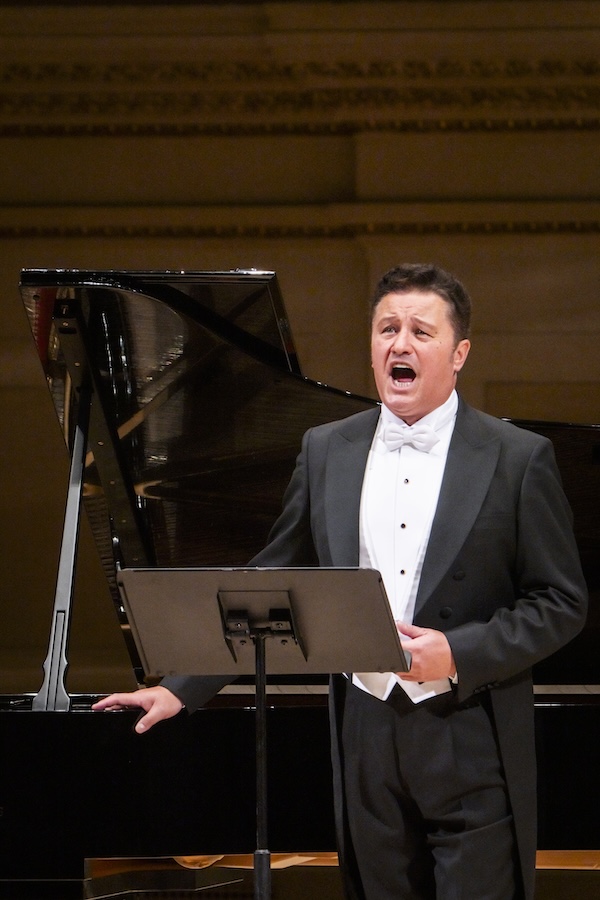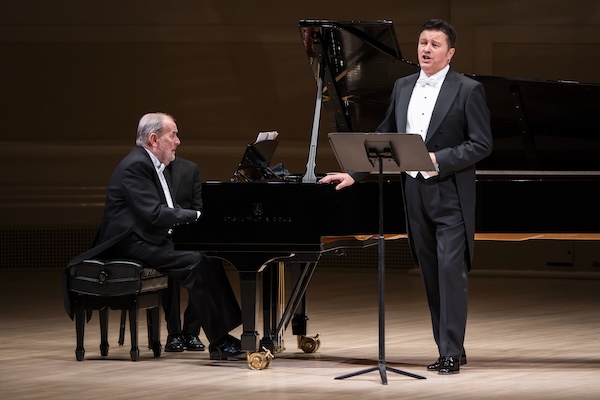Beczała finds his own tempo giusto in Carnegie Hall recital

Not every song recital is a lieder recital, but the performance by tenor Piotr Beczała and pianist Helmut Deutsch in Carnegie Hall on Monday, even though it featured songs by Russian, Norwegian, and Polish as well as German composers, was essentially a lieder recital.
The reason for that was the influence of the German composer, Robert Schumann, on the other four composers on the program. Tchaikovsky and Rachmaninoff grew up in a Western-looking Russian culture that seemed to find this German’s personality—the bizarre humor, the bursts of passion, the moodiness—particularly Russian. Something similar was going on in Poland and Scandinavia, as the songs of Mieczyslaw Karłowicz and Edvard Grieg attest.
On this night Beczała, whose big, pleasing voice has rung out in lead roles from Cavaradossi to Don José (look for him as Radames in the Met’s new Aida later this month), was emphasizing the intimate and the poetic over the grand gesture. His fans, who greeted him with prolonged applause when he stepped on stage, had to wait for the high notes until the program’s second half.
The tenor toned down his delivery so much that pianist Deutsch, that stalwart supporter of singers, had his foot on the piano’s left pedal (una corda) all evening. Especially in the early going, his playing, fluent and nuanced as it was, also sounded distant and unfocused. The piano’s melodious responses to the singer, essential to the lieder style, barely emerged. It seemed odd that a singer capable of being heard over entire orchestras should require such miniaturized accompaniment.
Furthermore, just turning down the volume does not a lieder singer make. Beczała’s fine diction, natural phrasing, and full-bodied tone in his middle range gave a listener much to like. And yet, as the program’s 30 songs unfurled, one began to wish for more variety—of timbre, of attitude, of subject matter.
Some of the sameness came from the choice of songs, favoring the dreamy and poetic over harsher drama. But some opportunities to turn up the heat were missed, as in Tchaikovsky’s “So what, then?” to a bitter love poem by the composer himself, with the piano waltzing gaily around the tormented singer in Schumannesque irony. Beczała and Deutsch delivered this one about as gently as the others in the set of nine Tchaikovsky songs that opened their program.
Five by Grieg to German texts, mostly from his Op. 48 with the popular “Ich liebe dich” added, concluded the first half. Here the pianist began to be heard with a countermelody here, a comment there, which detracted not at all from the singer’s modest delivery. (For whatever reason, the concert grand, lid up, was angled slightly upstage instead of straight-on to the audience.)
Before his untimely death at 32 while skiing in Poland’s Tatra Mountains, Karłowicz composed tuneful songs full of his love of the outdoors. The four on Monday’s program ranged from the pretty parlor song “It Goes Over the Fields” to the bitter twist ending of “The Enchanted Princess.” Beczała shaped the Polish texts artfully, and Deutsch provided textured backgrounds and eloquent postludes, especially in the closing song, “I Remember Quiet, Golden Days.”
Schumann, the master, was represented by six songs, beginning with “Wanderlied,” a perky, upbeat song of the road that, unlike many other songs of wanderers, expressed freedom and pleasure instead of disappointment and loneliness. A bit more energy here would have enhanced the contrast with “Der Nussbaum,” in which the singer took his vocal cues from the titular tree’s whispering boughs.
Schumann favorites such as “Die Lotosblume” and “Widmung” fared well, the one with delicately timed rubato and the other with surging fervor (and a touch of rushing the beat).
Full-textured piano writing is a hallmark of Rachmaninoff, already audible in his early Six Romances, Op. 4, which was sung in its entirety Monday night. Though still on the modest side, Deutsch made sure the web of counterpoint was heard. “Oh, stay my love, forsake me not!” swelled from a modest beginning to a dramatic climax and emphatic postlude. “Morning” was an intimate scene, high in the piano, high and tenderly diminuendo in the voice at the close.
“Silence of the secret night” trembled softly, but grew agitated in the middle. “Sing not to me, beautiful maiden” sat high in Beczała’s voice, reminding listeners that this was, indeed, a recital by a tenor—and one capable of an exquisite high pianissimo. In contrast, “Oh thou, my field” took a folk-style melody to a full, ringing high forte. “How long, my friend” topped that, closing the scheduled program with booming bass octaves in the piano and the singer’s final leap to a potent high B.
The applause, robust at first, kept going long enough to bring the artists back for four brief encores: Rachmaninoff’s “A Dream” and “Spring Waters,” Moniuszko’s “The Spinner,” and “Still wie die Nacht” by Carl Bohm.
Having thoughtfully provided texts and translations for all the songs, Carnegie Hall then set the lights too low to read them. A little more light in the house wouldn’t have hurt the performance.
Carnegie Hall presents soprano Asmik Grigorian and pianist Lukas Geniušas performing songs and piano pieces by Tchaikovsky and Rachmaninoff, 7 p.m. Thursday in Carnegie’s Zankel Hall. carnegiehall.org
